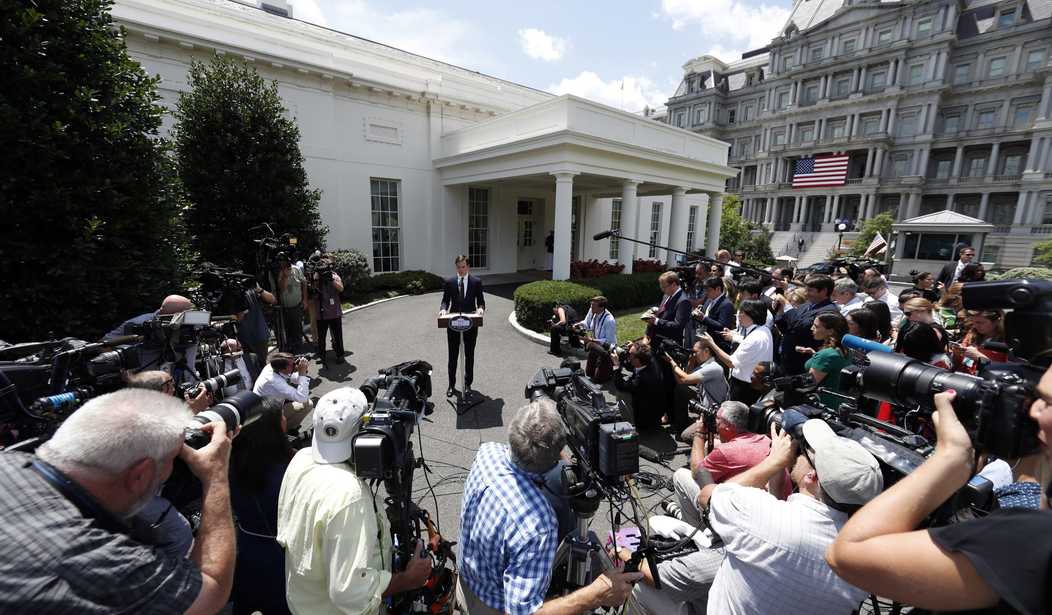WASHINGTON – Conservatives should be the biggest champions for freedom of the press, Rep. Mark Sanford (R-S.C.) said Monday during a discussion about President’s Trump’s turbulent relationship with the media.
“If you’re a conservative, freedom of the press ought to matter the most to us because if you’re a conservative, you’re saying, ‘Fundamentally, I believe in limited government and checks upon power and authority,’” Sanford said during an event hosted by House Judiciary Committee Democrats. “And if you really believe that, it’s absolutely vital that you have an open and free press.”
According to Judiciary Ranking Member John Conyers (D-Mich.), Trump has issued at least 100 tweets criticizing the national press, with attacks on either entire outlets or individual journalists. Rep. Steve Cohen (D-Tenn.) during his opening remarks listed what he described as Trump’s “reckless attacks,” which included his accusation during his first day in office that the media had understated the turnout of his inaugural crowd. That claim was followed by the White House’s “alternative facts” defense, and Trump’s assessment that the press is the “enemy of the American people.”
Conyers admitted that attacks on the press have not been reserved to this administration alone, noting that the Obama administration’s Department of Justice was accused multiple times of intimidating journalists in an attempt to get them to reveal confidential sources. Conyers said that he will join Rep. Ted Poe (R-Texas) in re-introducing the Free Flow of Information Act, a piece of legislation last introduced in 2013 that would protect journalists from revealing sources under certain circumstances.
Cohen criticized the Trump administration for denying American reporters access to an Oval Office meeting between Trump and the Russian foreign minister in May but allowing Russian media to photograph the encounter.
“This is the kind of thing you hear in repressive societies,” Cohen said, adding that a free press is what sets a functioning democracy apart from places like Russia, Turkey and Belarus.
Many of Monday’s panelists described Trump’s relationship with the press as “unprecedented,” while former Meet the Press host Marvin Kalb noted that the press is “struggling to find its financial foothold.”
Jennifer Rubin, writer of The Washington Post’s conservative Right Turn blog, who noted that her views do not represent those of her “failing” publication, as Trump has called the paper, said that if the administration had its way the only “repository of truth” would be the president.
“That is not how a democracy functions,” Rubin said. “It is not the role of the administration. It’s not within the administration’s power to control truth in a free society, and that is frankly why we have in large part a free press.”
It doesn’t help, she said, that this fractured relationship between the president and the press is on full display while the U.S. is engaged in struggles with non-democratic nations like Russia, China and North Korea. Rubin said that free people all over the world depend on the U.S., particularly on the sitting president, to stand up for individual freedoms. Repressive nations “find encouragement” in repressing their own people when they see the U.S. president attacking press freedoms, she said, adding that the U.S. needs to reaffirm its democratic values.
Rubin made a point to say that the administration does not deserve all the blame, arguing that so-called legacy media, well-established outlets like The New York Times and The Washington Post, need to set the pace for what news stories get coverage. She called for more investigative journalism and more fact-checking.
“I find it horrifying as a member of Congress to go on television these days because inevitably we’re responding to the latest crazy tweet instead of talking about deficit, healthcare, tax reform, whatever, that really does impact people’s lives,” Sanford said.
Columbia Journalism Review editor-in-chief Kyle Pope said that the press needs to re-calibrate and decide whether it’s contributing to the problem by reporting on every tweet from the president.









Join the conversation as a VIP Member